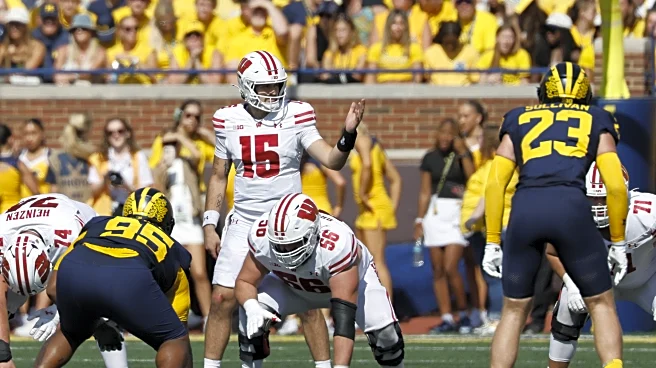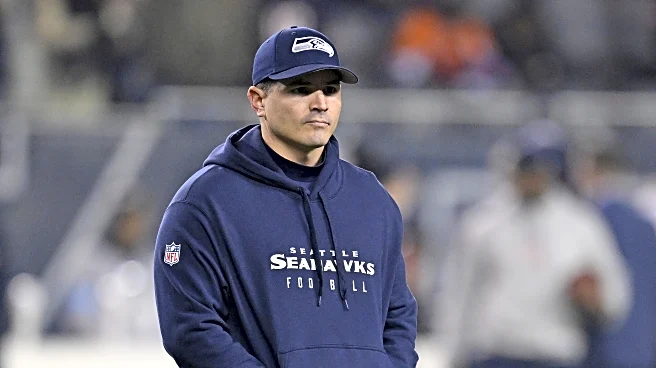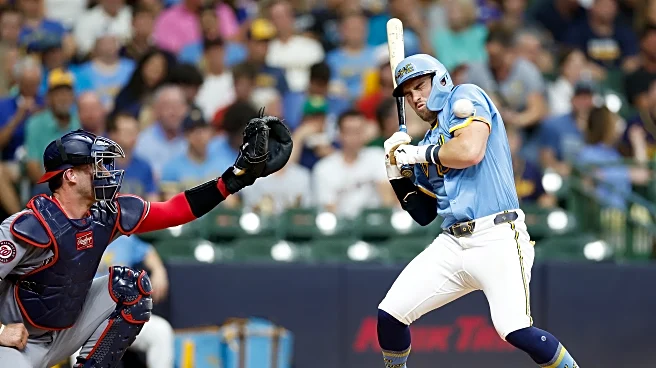The Wisconsin Badgers dropped their third straight game in a 24-10 loss to the No. 20 Michigan Wolverines on Saturday, marking their eighth straight loss to a Top 25 opponent under Luke Fickell.
Wisconsin came out strong with a touchdown on its opening drive, but its offense was largely ineffective after that, with the Badgers struggling to get their run game going.
Defensively, Wisconsin fought hard, getting several stops and keeping the team in the game through the first three quarters. But, they
ultimately couldn’t play enough complemetary football in the loss, dropping to 2-3 on the season.
Here are three quick takeaways from the Badgers 24-10 loss to Michigan on Saturday.
Defense shines with heart
Wisconsin came into the game as the No. 2 run defense, going up against Michigan’s No. 6 rush offense. I predicted Michigan to be able to win that battle and rush for around 4.5 yards per carry. And from the first drive, it seemed like the Wolverines were going to cruise, with Justice Haynes getting a 43-yard run and later scoring a touchdown to tie things up.
But, from there, the Badgers got quite a few big stops, despite Michigan having some momentum. The Badgers forced back-to-back punts, then got Michigan to a field goal after Bryce Underwood had a great 32-yard throw to Andrew Marsh up the sidelines.
Wisconsin forced another three-and-out late in the second quarter, giving its offense plenty of opportunities to put up points.
To start the second half, Michigan had momentum yet again with an 11-play, 66-yard drive, but the Badgers, once again, got a key stop in their own territory to force a short field goal, which kicker Dominic Zvada missed.
The defense got another three-and-out after that before starting to wear down, with its offense consistently getting off the field quickly with punts. Michigan got a touchdown, a turnover on downs, and a touchdown on its next three drives, while Wisconsin’s offense got nothing, giving the Wolverines a 24-7 lead in the fourth quarter.
Michigan’s counting stats looked good, with the Wolverines establishing enough of a run game while Underwood had a number of impressive throws. But, the defense showed clear heart and willed its way to keep Wisconsin in the game for as long as they did.
Questionable playcalling
The Badgers had a great first drive, being able to establish enough of a run game (9 rushes for 39 yards on the opening drive), while Hunter Simmons had three completions for 36 yards. Dilin Jones capped things off with a touchdown, and Wisconsin was off to a good start.
But, from there, the Badgers offense completely shut down, as their run game had no answers, with Michigan showing no respect for Wisconsin’s passing game. Instead, they focused on loading boxes, crashing edges, and defending the run, which put the Badgers in tough second and third-down situations.
Following the opening touchdown, Wisconsin had seven straight punts. None of those drives went longer than six plays or 23 yards. What really stood out was the first-down playcalling from offensive coordinator Jeff Grimes.
On those seven drives, Wisconsin ran the ball on first down seven times for 13 yards. They threw three times, completing two passes for 23 yards.
With Michigan clearly selling out against the run, the Badgers needed to take advantage of 1-on-1 opportunities and throw more on early downs, rather than getting minimal gains and putting themselves in unfavorable situations on second and third downs against a tough defensive front.
Wisconsin finally threw the ball down 17-7 on first down. And Hunter Simmons immediately found Vinny Anthony for 27 yards on a 1-on-1 throw. But then, one play after, Simmons threw an interception, underthrowing a 1-on-1 ball to Chris Brooks Jr. up the sideline. It was a fine read, but a tough throw to make. Still, there was a clear pass interference on the play that wasn’t called, proving to be a killer for Wisconsin.
It felt all afternoon that Grimes didn’t trust Simmons to make plays, which is never a good sign for an offense. There were two questionable third-down wildcat calls that were unsuccessful.
Wisconsin needs to throw more on early downs to get teams to respect its running game. After that 27-yard completion, the Badgers had one of their best runs since the first drive: a four-yard gain from Darrion Dupree. It’s not much, but Wisconsin needs positive plays more than anything in the run game to set up the later downs.
Pass protection remains an issue. There are too many linemen losing 1-on-1 blocks, but they need to have more of the quick passing game on first down.
Urgency issues?
Heading into the game, it felt like head coach Luke Fickell was showing urgency with the quarterback change to Hunter Simmons in place of a struggling Danny O’Neil.
After his quality drive to end the Maryland game, it felt like the Badgers should at least give Simmons a chance to see what he could do. But, there were two different situations where it felt Wisconsin wasn’t urgent enough on Saturday.
With the Badgers having the ball for a two-minute drill down 10-7, it felt like the perfect opportunity to head into halftime with momentum. Wisconsin needed an answer after a big three-and-out stop by the defense, given that Michigan would open the second half with the ball.
And things started well. Simmons hit tight end Lance Mason for a 16-yard pass to get Wisconsin to its own 44-yard line. But, Wisconsin went with two run plays after that, running the clock down all the way to 34 seconds before a 3rd & 3 at the Michigan 49-yard line.
It was clear Fickell and Jeff Grimes didn’t want to give the ball back to Michigan to end the half with the Wolverines having three timeouts. But, Wisconsin finally had some momentum after actually throwing on first down and had a great opportunity to score near midfield with 90 seconds left with timeouts.
Instead, the Badgers took the ball out of Simmons’s hands, giving him one throw on 3rd down, which was an incompletion. Wisconsin punted in plus territory and gave away its momentum. That’s playing not to lose, rather than win, which has been a theme for Fickell.
Then, at the end of the game, it felt like the head coach gave up on his team. Wisconsin had just gotten a field goal to cut the score to 24-10 with just under three minutes left. Michigan only got four yards on first down, but Fickell didn’t call any of his three timeouts, allowing the clock to run all the way down to the two-minute warning.
Then, the Wolverines got two yards on second down, and Fickell didn’t call a timeout again. Yes, Michigan got the first down on 3rd & 4, and they had a two-score lead, but the defense and team had fought all day long. And Fickell waved the white flag, rather than remaining competitive and giving his offense another chance to get the ball. That’s unacceptable in that situation.
















